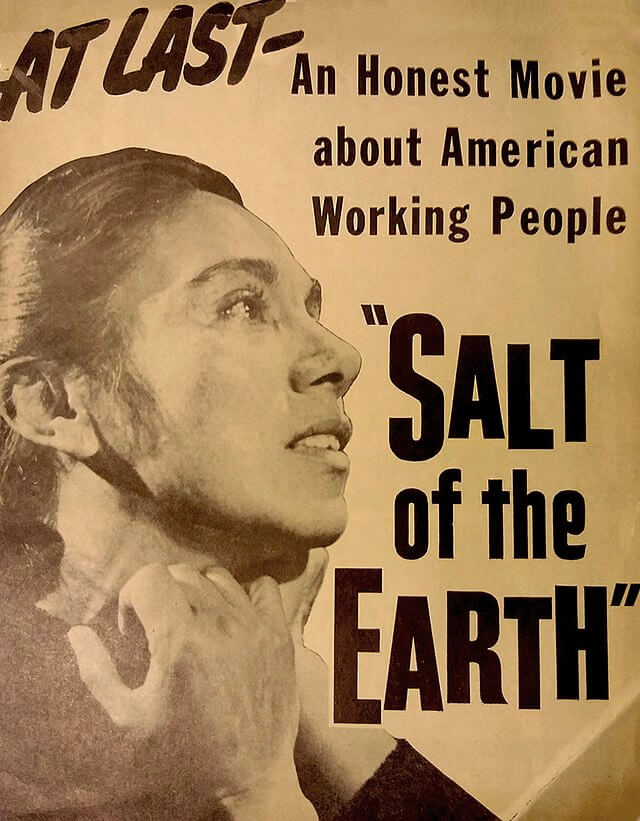In a new podcast, blacklisted filmmakers make a movie — and an FBI agent lets them
Jon Hamm plays a G-man spying on the production of 1954’s ‘Salt of the Earth’ in Audible’s ‘The Big Lie’

Graphic by Angelie Zaslavsky
John Mankiewicz met blacklisted filmmaker Paul Jarrico in 1997. Jarrico had a story to sell him.
Fifty years after the the start of the Hollywood Blacklist, Jarrico, the co-writer of films like “Song of Russia,” approached Mankiewicz, who then had a production company at Paramount, with an idea for a screenplay about his most embattled project: the 1954 pro-union film “Salt of the Earth,” which, against all odds, successfully wrapped in the thick of McCarthyism.
“Paul figured that the only way they could have finished the movie – after their star was deported and they had to go to Mexico to film the scenes on a fake call sheet and smuggle the film back across the border – was if the FBI guy who was following them around had decided to look the other way at the last minute,” said Mankiewicz.
Jarrico’s new screenplay would follow the G-man who dogged the production of the “Salt of the Earth,” produced by Jarrico, helmed by Hollywood Ten member Herb Biberman and written by blacklisted screenwriter Michael Wilson under their company, Independent Film Productions. As if the crew weren’t enough to raise the suspicions of the Bureau, there was also the content. The film was based on the 1951 miners’ strike against the Empire Zinc Company in New Mexico and starred union leader Juan Chacón as a version of himself. Inspired by neorealism, critics dubbed the film “subversive,” the FBI investigated its financing and, when it was released, only a dozen theaters would screen it.
But by 1997, “Salt of the Earth” was preserved by the Library of Congress and Jarrico was recognized by the industry for his long crusade to restore the credits of blacklisted screenwriters. In fact, just a few days after Mankiewicz and Jarrico sold the script, Jarrico was honored by the Writers Guild for his efforts. Hours later, on October 28, 1997, driving home to Ojai, Jarrico was killed when his car struck a tree. He was 82.
Mankiewicz says when he visited Jarrico’s widow, Lia, she told him he should write Jarrico’s story. He did and, after many years of trying to produce it as a film – in between writing for the TV shows “House” and “House of Cards” – it is now debuting as an Audible podcast co-written by his collaborator Jamie Napoli. The seven-episode series stars Kirk Baltz as Jarrico, Bradley Whitford as Wilson, John Getz as Biberman and Jon Hamm in the leading role of a conflicted FBI agent. It’s narrated by Mankiewicz’s cousin, Ben Mankiewicz, host of Turner Classic Movies, which first aired “Salt of the Earth” on TV in the 1990s.
The podcast’s title, “The Big Lie,” was a somewhat obscure term when Mankiewicz first came up with it; now it’s familiar headline fodder. Mankiewicz is happy to have kept it, seeing how it once again reflects a divided nation and – in the week of its June 16 release – a very different kind of action by Congress. Whereas in the 1950s the Capitol was in the grips of HUAC witch hunts, today many of its members, as part of the January 6 Committee, are working to disprove Trump’s false claims of election fraud.
In the show, the Big Lie, as articulated by Hamm’s fictional agent Jack Bergin, is what Communists are trying to spread through their filmmaking – the notion that “their way is better.” This, of course, is the real lie: that filmmakers trying to earn a living or advance messages about human dignity and civil rights are a threat to America.
While Mankiewicz, 68, the grandson of “Citizen Kane” writer Herman Mankiewicz and nephew of director Joseph Mankiewicz, grew up with a Hollywood pedigree, he says he had no connection to the blacklist. But researching and writing the show “radicalized” him.
“To think you’re here to be a writer and just make money doing that and support a family is crazy,” Mankiewicz said. “And then to have someone say, ‘No, you’re not even allowed to try,’ just seemed obscene to me.”
In the 1950s, “Salt of the Earth” raised a labor conflict mirrored in some ways by the origins of the blacklist. Mankiewicz says this dark period in entertainment began as a way to bust up unions and guarantee a greater profit for the studios. Hollywood was an easy industry for the government to target as “it’s very hard for Americans to perceive Humphrey Bogart as a working man.”
But “The Big Lie,” directed by Aaron Lipstadt, goes beyond the moral lessons of the Red Scare, giving listeners a tense thriller informed by real-life and styled after film noir. There are double agents, cameos from Jack Warner and Howard Hughes and a domestic drama at the center. There are also moments where Latinx women and children recreate their imprisonment in cramped cells, recalling recent events near the border.
Mankiewicz hopes his show’s resonance, between the misinformation of the government then, and its quest for truth against Donald Trump’s lies today, comes through.
“It’s propaganda in both cases,” Mankiewicz said. “And for me, propaganda in service of stopping storytelling is serious business.”
















